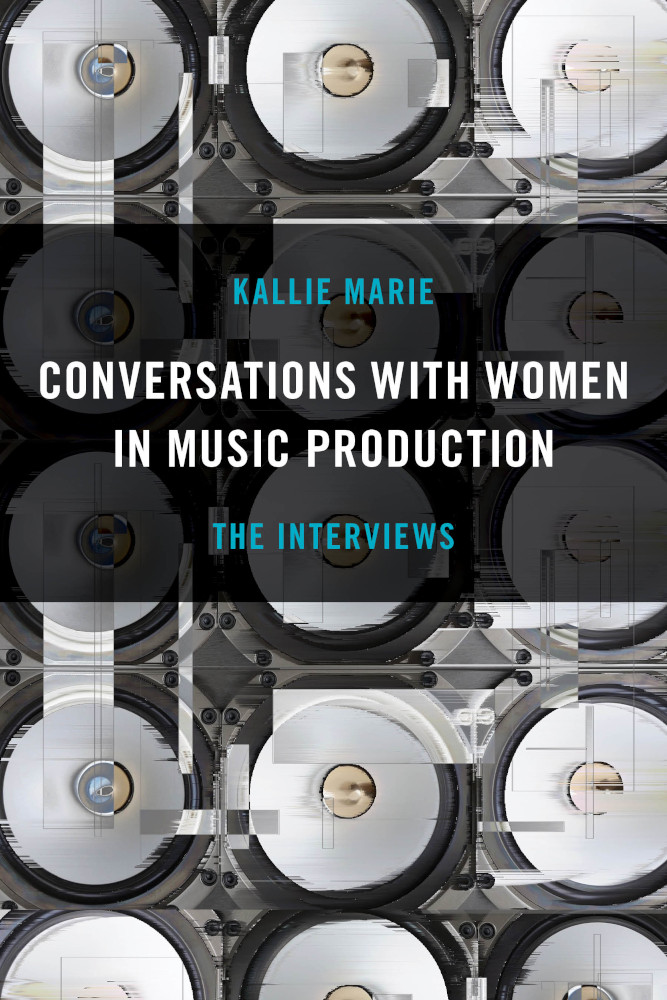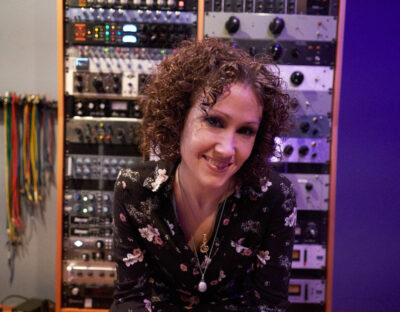“Women in Music Production”: Navigating Complex Career Paths
Audio engineering is a unique field. It melds art, science, technology, creativity, and personal satisfaction to form a distinct mix.
Setting your sights on an audio career means the opportunity for unmatched highs, but also harrowing lows. Depending on your background, you may enter the arena with advantages – or face added challenges.
Among the differentiating demographics in audio is gender. Females have long felt outnumbered in the studio, and recent research backs that up: According to the career data platform Zippia, just 7.7% of audio engineers employed in the US are women.
That’s a notable disparity, but severe workplace imbalance is only one part of the story. A prolific producer, composer and engineer (and SonicScoop contributor), Kallie Marie takes a deeper look at female studio practitioners in her recently published book, Conversations with Women in Music Production: The Interviews (Backbeat Books, 2022).
Marie’s accomplished subjects represent wide-ranging experience, including Abhita Austin, Leslie M.G. Bird, Hillary Johnson, Silvia Massy, Johnette Napolitano, Kerry Pompeo, Ebonie Smith, Andrea Yankovsky and more. They provide up-close perspectives on navigating their careers, offering personal and professional insights on diversity, childcare, healthcare, pay equity, and the impact of technological change in audio.
However you identify, Women in Music Production helps to rethink key fundamentals. The book expansively explores complex relationships between technicians, creators, and audio tech. In the process, it shines intriguing new light not just on how gender impacts career paths, but how music itself is recorded, produced and ultimately experienced.
SonicScoop and Marie talked about her adventures writing Women in Music Production.
When did the idea for “Conversations with Women in Music Production” start to form?
The idea started to form sometime in 2017, maybe late 2016 when I was asked to contribute a chapter to a book called Producing Music (Perspectives on Music Production). The initial findings were published in that book, in 2019. At that point I had so much material there was enough for a book, and I really felt that everyone’s conversations and stories said more together than alone.
That’s an organic start to a next book! What types of people did you choose to interview for Conversations – what qualified someone as an appropriate interview subject for this book?
This is laid out in the forward of the book as being:
“Specifically on recording engineers and record producers. The term producer is used here in the traditional sense and not as it is used today, to encompass anyone who utilizes software to work on music or who has some means of production to produce their own work. Here the term delineates a person hired by either a studio, an artist or band, or a label to work on the production aspects of the music (including but not limited to the stages of preproduction, production, and sometimes extends to postproduction) and help oversee and guide the creative and technical aspects of music production as a whole.
(You will see that I do not include live sound engineers, mix engineers, mastering engineers, DJs, or self-stylized and self-producing artists on the whole. There may be more or fewer women and gender minorities in some of these professional spaces than in others. Although one or two producers interviewed here may also be music makers and artists and there are in some cases a crossover with self-producing artists, theirs is a different set of unique challenges. These I believe to have their own professional circumstances that present too broad a topic to address adequately within this work. My exclusion of these other career pathways allows me to focus on aspects specific to recording engineers, record producers, and audio engineers, like the ability to sell oneself to an artist, to thrive in networking situations, and to prove technical prowess.)”
Additionally, my criteria was that anyone I interviewed had to have been working as such, professionally by 2016 for 10 years or more.
You bring up fascinating aspects of gendered perception in the book. An interesting term I encountered early on, for example, was the “audible male gaze” – what is that and why does it matter?
The audible male gaze is a term I coined, which takes a nod from “the male gaze” which is a feminist term/theory coined in 1975 by Laura Mulvey who applied it to cinema, but who was also borrowing from philosopher Jean-Paul Sartre’s concept of le regard, aka the gaze in his work in 1943.
Both works suggest that by being viewed or always being the subject of the viewer there is a power imbalance. Without going down the rabbit hole here, the audible male gaze further extends Mulvey’s theory into the realm of audio and music, such as to say that if it is not pleasing to the heterosexual male, can that music be valued, or the artist making it, valued enough to be signed, promoted, marketed, etc…?
That is to say, for example, that some artists or styles of music that women were/are engaging in maybe have been less acceptable or accessible to them, as well as those in gender minority or queer artists when there’s been a fairly narrow set of gatekeepers and gatekeeper tastes – someone like Yoko Ono, who may have made “unattractive music” (insert “for a woman”). We have come a long way, but there are still crossroads to get to.
The point isn’t that what is created shouldn’t be attractive, but that it shouldn’t have to be, or that there’s room for different tastes. That classic feminine “attractiveness” can be limiting musically and there are more dimensions of expression, no matter who you are.
You spoke with so many highly accomplished women in the audio field for this book. Were there any memorable “a-ha” moments that stand out for you when conducting these interviews?
Yes! I was so surprised at how similar so many of us were. Personally I was astounded at how many of us had started out with things like tape recorders, and fascination with recording little things, little home projects, even as small children.
It was refreshing to see that rather than being different we were all actually quite similar in some ways, across ages and demographics. We exist.
What were some surprising psychological patterns of thinking that you uncovered when writing this book?
Nothing was really surprising to me. I have studied these things for years, decades… Susan Faludi’s Backlash: The Undeclared War Against American Women was something I read in high school. I’ve long been an academic in this area, and nearly did my MA in it, but decided I could do more damage to the establishment by forging ahead in music and audio, and did my MA in that instead.
Honestly, I couldn’t imagine my life without music and recording as the focus, so I consciously chose to keep recording, producing, and composing. I will say something that did surprise me is how frequently the topic of clothing or dress came up, which I had purposefully avoided. That could be its own book, and there is plenty of research on that already, but it was interesting to note that they brought it up on their own and were hyper aware of themselves – which isn’t the surprising part, just that they brought it up without prompting and how present to mind it was for some of them.
It sounds like you definitely had some interesting experiences in the writing of Conversations. Finally, how do you hope that reader attitudes might evolve by reading this book – what is the best-case scenario?
I’d say if they’re reading it, already that’s great. It means that they are open to exploring the topic, and that they have a vested interest, if not at least curiosity.
We should all be curious about our world and about the biases that we passively learn through life. Socialization plays a huge role in our daily lives, being conscious of ourselves and others creates an aware community.
Musicians have always been a super-conscious part of the culture of the planet and are incredible agents of change. We may not be able to change everything about the world that shapes us as individuals, but awareness is always the first step of change. Self-exploration is never a wasted investment, and wearing someone else’s shoes is often an eye-opening journey.
The best case scenario: some deep thought that might lead to small changes…but all of society has to do that work too. The music/recording industries are, after all, a microcosm of cultures within subcultures.
I honestly can’t say what the best-case scenario is other than more awareness, lots of deep reflection, and hopefully an openness to change – there’s a lot of great music to be made. It would be a pity if some of the great artists or records were never heard because of something society decided about them.
— David Weiss is an Editor for SonicScoop.com, and has been covering pro audio developments for over 20 years. He is also the co-author of the music industry’s leading textbook on synch licensing, “Music Supervision, 2nd Edition: The Complete Guide to Selecting Music for Movies, TV, Games & New Media.” Email: david@sonicscoop.com
Please note: When you buy products through links on this page, we may earn an affiliate commission.









[…] Source link […]